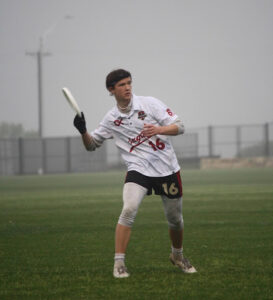Nike sells a University of Oklahoma jersey with the number one on it, Jalen Hurts’ number, for $100. Other sites market shirts or jerseys with his number and name on them starting at $50.
Hurts probably averages over 40 hours per week participating in football-mandated activities. He trains. He works. He watches film. He structures his diet. He also goes to class and does homework.
Then, he steps onto the field at Gaylord Memorial Stadium in front of a sold-out crowd of 80,000 people and throws for 415 yards and rushes two touchdowns, putting up 55 points against Texas Tech University.
I feel I can safely say football consumes Hurts’ life. He works and showcases stellar performances every week.
Yet what does he receive in return? He works to make those jerseys worth something, but he sees none of the profit.
Athletes across the NCAA face this same predicament. According to the NCAA, student athletes cannot be represented by an agent nor can they be compensated for the usage of their name or likeness.
This is not a new problem. The issue of paying players beyond scholarships and allowing compensation for athletes’ images is a long debated issue.
California Governor Gavin Newsom has taken action to show he and the state of California are exhausted by the debates and want the NCAA to change its policies .
On Monday, Sept. 30, Governor Newsom appeared on Lebron James’ show, “The Shop,” and signed the Fair Pay to Play Act, allowing all college athletes within the state of California the ability to be represented by an agent and receive payment for the use of their name, likeness and image.
California finally realized if they wanted real change in the realm of college athletics they needed to force the NCAA to change—debating creates a circular, never-ending cycle of unnecessary arguments with nothing changing. As a result, Governor Newsom put the heat on the NCAA.
This bill will take effect in 2023, which gives the NCAA and other states three years to make a decision. Either the NCAA adapts and changes their amateurism policies, or they eliminate all California schools from eligible competition within NCAA conferences.
After Governor Newsom signed the bill, the NCAA released the following statement:
“As a membership organization, the NCAA agrees changes are needed to continue to support student athletes, but improvement needs to happen on a national level through the NCAA’s rules-making process. Unfortunately, this new law already is creating confusion for current and future student athletes, coaches, administrators and campuses, and not just in California.”
The full statement can be found here.
Confusion? Interesting word choice, in my opinion.
It is confusing how someone’s name can be used for profit but the person who bears the name does not see a dime. It is confusing how an 18 to 22-year-old gives over 40 hours a week for the love or criticism of thousands—upholding more pressure than many of us can ever understand.
Hey, NCAA—it is up to you to provide clarity. The time is now to make change or risk other states following suit and creating mass collegiate athletic chaos and affecting one of the nation’s highest-grossing sports avenues.
However, the NCAA has more work to do than just allowing athletes to benefit from their likeness.
Yes, I think athletes should be paid for the usage of their name, image or likeness. But this does not help all NCAA athletes. It does not benefit Division II athletes or female golfers, for example, who are not amassing huge endorsement deals.
I have one big fear with this law and this particular direction of paying athletes: those on top will benefit the most, and the rest will continue to go unnoticed.
The players who will benefit financially from this law are the same players who will be signed to huge contracts in their perspective sports.
Look at Baker Mayfield, former Sooners quarterback. His name and likeness were plastered all across the state of Oklahoma and the nation. Imagine him getting paid for all those moments. Then he goes number one in the NFL draft, signing a contract worth $32.68 million over four years.
He will get paid. He is getting paid now.
Think about the Division II women’s soccer player who goes to school and has to work a job. She is not making any money off of her name. She is not going to sign a big professional contract; yet, she practices and plays over 40 hours a week. Her weekends are consumed with games or sport-related events. She also puts in work, but she sees no real benefit from this law.
I am confused.
Do not get me wrong. Every athlete should have the right to earn money for the usage of their name and image because they bled and sweat and fought to make their name worth something. But I still fear for the student athlete as a whole.
I am not just speaking to this as a random outsider. I am the Division II soccer athlete.
Change needs to happen, and it needs to come nationally from the NCAA.
I am still not sure what successful change really looks like, but a step in the right direction is all we can really ask for, right?
I guess I am still a little confused.














Be First to Comment